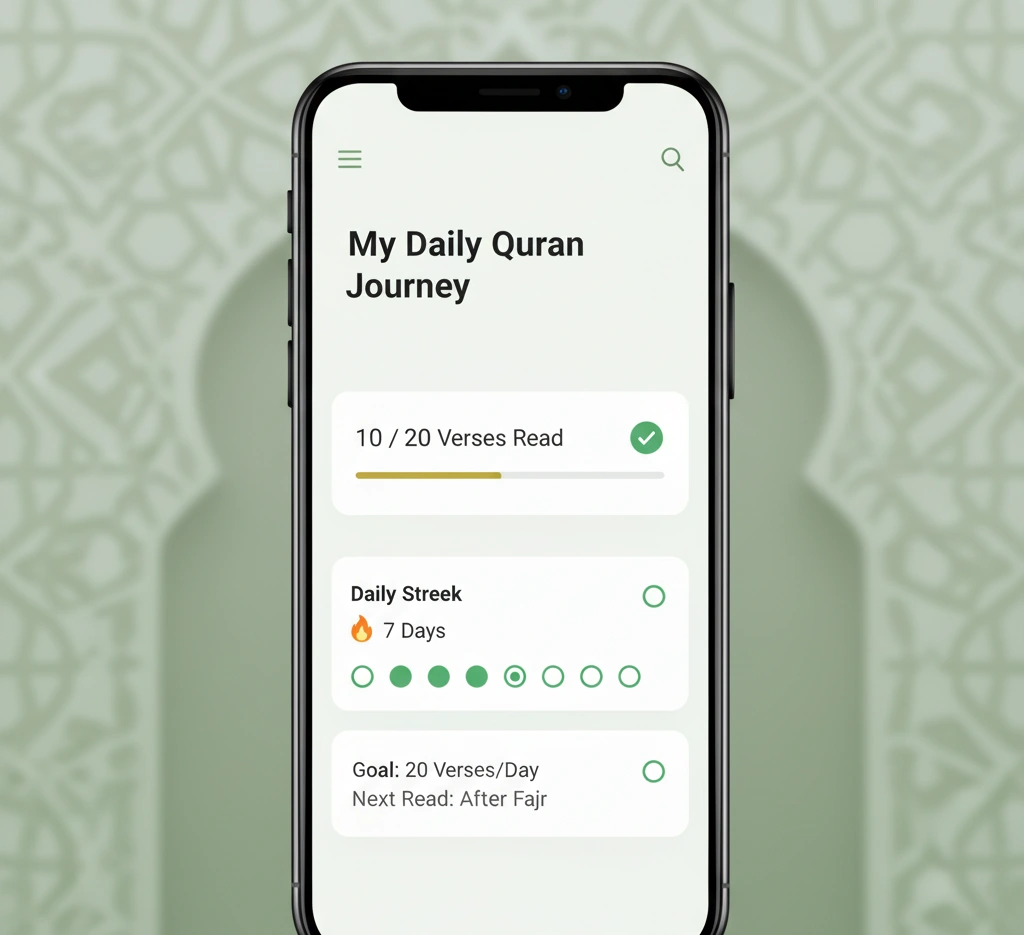Introduction
Development of the daily Quran recitation routine transforms routine to regular worship. This guide provides the readers with practical and culturally conscious steps in the US, UK, Australia, and Pakistan. It is concerned with long-term habits, but not excellence.
Why a Daily Quran Routine Matters

The daily reading of the Quran will be like spiritual food. The frequent recitation helps to understand better, relax the mind, and make everyday decisions.
Connection: The objective is to be consistently connected, not to be competitive or to be fast.
Common Barriers and Simple Fixes
No Time
Fix: Replace one low-value habit (social scrolling, passive video) with 5–10 minutes of recitation.
Lack of Focus
Fix: Use a repeated anchor (after Fajr, lunch break, or before bed).
Unclear Goals
Fix: Set measurable targets (5 verses, 1 page, or 2 audio minutes).
Guilt After Lapse
Fix: Restart immediately with the smallest commitment. No reproach.
Step-by-Step Plan to Build the Habit

1. Start Tiny and Scale
Begin with a micro-commitment: one verse or two minutes daily. Small wins build neural momentum. After two weeks increase by 1–2 verses.
2. Anchor the Habit to an Existing Routine
Attach recitation to something you already do.
Examples:
- After Fajr before work
- During lunch break before returning to tasks
- Before sleep as a mindful close to the day
Anchoring removes decision friction.
3. Choose a Realistic Daily Target
Examples:
- Beginner: 5 verses or 5 minutes daily
- Intermediate: 1 page or 10 minutes
- Focused: 8–10 pages daily to complete a Juz in 30 days
Make targets time-bound and measurable.
4. Mix Recitation, Translation, and Short Reflection
Rotate modes to keep interest and deepen meaning:
- Day 1: Recite and focus on tajweed
- Day 2: Read translation and note one phrase
- Day 3: Listen to a short tafsir clip and reflect
Understanding the words sustains motivation.
5. Track Progress Simply
Use a one-line daily log:YYYY-MM-DD | Verses/pages | 1-line takeaway | Time of day
Example:2025-10-27 | 5 verses | Mercy in verse 32 | after Fajr
Tracking shows trends and keeps accountability.
6. Use Accountability, Not Pressure
Partner with a friend or small group. Share weekly goals, not daily failures. A weekly check-in beats public shaming.
7. Use Micro-Rules When Discipline Dips
If motivation is low, apply the two-minute rule. Two minutes often extends to ten.
When travel disrupts routine, default to one verse and reflection.
Tools and Supportive Habits
- Reminders: Phone alarms or app notifications
- Audio: Listen while commuting or doing chores
- Bookmarks: Physical or digital bookmarks to save place
- Notes: Short journal or voice memo for reflections
Tools aid habit formation but do not replace consistent anchors.
Sample Schedules (Practical)

Busy Starter
1 verse after Fajr, 1 verse before bed (total 2 verses/day).
Working Parent
5 minutes during lunch, 5 minutes after Isha.
Student/Professional
10 minutes before study session + 10 minutes at night.
Adjust for sleep schedules across time zones.
Setting Monthly Goals and Reviews
Monthly Goal Example
Finish one Juz or improve tajweed in Surah ___ in 30 days.
Review Cadence
Weekly check (days read) and monthly review (what changed).
Adjustment Rule
If you miss more than 30% of days, reduce daily target and re-anchor.
Dealing with Setbacks
Treat setbacks as data. Ask which lever failed: time, anchor, or goal size. Fix that lever. Restart with the smallest commitment.
Measuring Real Success
Two metrics matter:
- Frequency: Days per week you recite
- Reflection: One short note about impact or learning
Frequency shows habit. Reflection shows spiritual effect.
Ethical and Sensitive Notes
Be humble about comparisons. Avoid claims that tie habit to guaranteed spiritual status. Encourage dua (prayer) for istiqamah and steady effort.
Conclusion – Start Today
Choose one verse right now. Note the time and write one sentence about what it meant. Small acts, done consistently, become lasting habits.
If you want to recite Quran with proper tajweed ( pronunciation ) that is the very important for all Muslims then we must recommend you to enroll for the free trial class from our certified tutors. Al Hamd Islamic Center



